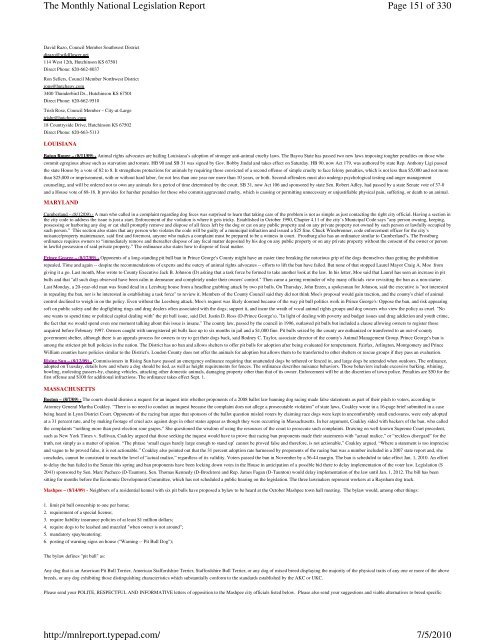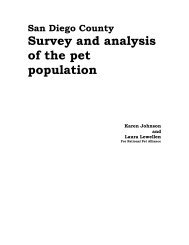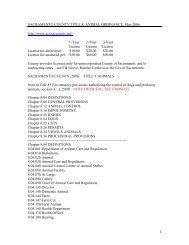Page 1 of 330 The Monthly National Legislation Report 7/5/2010 ...
Page 1 of 330 The Monthly National Legislation Report 7/5/2010 ...
Page 1 of 330 The Monthly National Legislation Report 7/5/2010 ...
Create successful ePaper yourself
Turn your PDF publications into a flip-book with our unique Google optimized e-Paper software.
<strong>The</strong> <strong>Monthly</strong> <strong>National</strong> <strong>Legislation</strong> <strong>Report</strong>http://mnlreport.typepad.com/<strong>Page</strong> 151 <strong>of</strong> <strong>330</strong>7/5/<strong>2010</strong>David Razo, Council Member Southwest Districtdjrazo@wildflower.net114 West 12th, Hutchinson KS 67501Direct Phone: 620-662-8037Ron Sellers, Council Member Northwest Districtrons@hutchgov.com3400 Thunderbird Dr., Hutchinson KS 67501Direct Phone: 620-662-9510Trish Rose, Council Member – City-at-Largetrishr@hutchgov.com18 Countryside Drive, Hutchinson KS 67502Direct Phone: 620-663-5113LOUISIANABaton Rouge – (8/11/09) - Animal rights advocates are hailing Louisiana’s adoption <strong>of</strong> stronger anti-animal cruelty laws. <strong>The</strong> Bayou State has passed two new laws imposing tougher penalties on those whocommit egregious abuse such as starvation and torture. HB 90 and SB 31 was signed by Gov. Bobby Jindal and takes effect on Saturday. HB 90, now Act 179, was authored by state Rep. Anthony Ligi passedthe state House by a vote <strong>of</strong> 82 to 8. It strengthens protections for animals by requiring those convicted <strong>of</strong> a second <strong>of</strong>fense <strong>of</strong> simple cruelty to face felony penalties, which is not less than $5,000 and not morethan $25,000 or imprisonment, with or without hard labor, for not less than one year nor more than 10 years, or both. Second-<strong>of</strong>fenders must also undergo psychological testing and anger managementcounseling, and will be ordered not to own any animals for a period <strong>of</strong> time determined by the court. SB 31, now Act 106 and sponsored by state Sen. Robert Adley, had passed by a state Senate vote <strong>of</strong> 37-0and a House vote <strong>of</strong> 68-18. It provides for harsher penalties for those who commit aggravated cruelty, which is causing or permitting unnecessary or unjustifiable physical pain, suffering, or death to an animal.MARYLANDCumberland – (8/12/09) - A man who called in a complaint regarding dog feces was surprised to learn that taking care <strong>of</strong> the problem is not as simple as just contacting the right city <strong>of</strong>ficial. Having a section inthe city code to address the issue is just a start. Enforcement <strong>of</strong> the violation is where it gets tricky. Established in October 1990, Chapter 4.11 <strong>of</strong> the city’s Municipal Code says “any person owning, keeping,possessing or harboring any dog or cat shall promptly remove and dispose <strong>of</strong> all feces left by the dog or cat on any public property and on any private property not owned by such person or lawfully occupied bysuch person.” This section also states that any person who violates the code will be guilty <strong>of</strong> a municipal infraction and issued a $25 fine. Chuck Winebrenner, code enforcement <strong>of</strong>ficer for the city’snuisance/property maintenance, said first and foremost, anyone who makes a complaint must be prepared to be a witness in court. Frostburg also has an ordinance similar to Cumberland’s. <strong>The</strong> Frostburgordinance requires owners to “immediately remove and thereafter dispose <strong>of</strong> any fecal matter deposited by his dog on any public property or on any private property without the consent <strong>of</strong> the owner or personin lawful possession <strong>of</strong> said private property.” <strong>The</strong> ordinance also states how to dispose <strong>of</strong> fecal matter.Prince George – (8/17/09) - Opponents <strong>of</strong> a long-standing pit bull ban in Prince George's County might have an easier time breaking the notorious grip <strong>of</strong> the dogs themselves than getting the prohibitionrepealed. Time and again -- despite the recommendations <strong>of</strong> experts and the outcry <strong>of</strong> animal rights advocates -- efforts to lift the ban have failed. But none <strong>of</strong> that stopped Laurel Mayor Craig A. Moe fromgiving it a go. Last month, Moe wrote to County Executive Jack B. Johnson (D) asking that a task force be formed to take another look at the law. In his letter, Moe said that Laurel has seen an increase in pitbulls and that "all such dogs observed have been calm in demeanor and completely under their owners' control." <strong>The</strong>n came a jarring reminder <strong>of</strong> why many <strong>of</strong>ficials view revisiting the ban as a non-starter.Last Monday, a 20-year-old man was found dead in a Leesburg house from a headline grabbing attack by two pit bulls. On Thursday, John Erzen, a spokesman for Johnson, said the executive is "not interestedin repealing the ban, nor is he interested in establishing a task force" to review it. Members <strong>of</strong> the County Council said they did not think Moe's proposal would gain traction, and the county's chief <strong>of</strong> animalcontrol declined to weigh in on the policy. Even without the Leesburg attack, Moe's request was likely doomed because <strong>of</strong> the way pit bull politics work in Prince George's: Oppose the ban, and risk appearings<strong>of</strong>t on public safety and the dogfighting rings and drug dealers <strong>of</strong>ten associated with the dogs; support it, and incur the wrath <strong>of</strong> vocal animal rights groups and dog owners who view the policy as cruel. "Noone wants to spend time or political capital dealing with" the pit bull issue, said Del. Justin D. Ross (D-Prince George's). "In light <strong>of</strong> dealing with poverty and budget issues and drug addiction and youth crime,the fact that we would spend even one moment talking about this issue is insane." <strong>The</strong> county law, passed by the council in 1996, outlawed pit bulls but included a clause allowing owners to register thoseacquired before February 1997. Owners caught with unregistered pit bulls face up to six months in jail and a $1,000 fine. Pit bulls seized by the county are euthanized or transferred to an out-<strong>of</strong>-countygovernment shelter, although there is an appeals process for owners to try to get their dogs back, said Rodney C. Taylor, associate director <strong>of</strong> the county's Animal Management Group. Prince George's ban isamong the strictest pit bull policies in the nation. <strong>The</strong> District has no ban and allows shelters to <strong>of</strong>fer pit bulls for adoption after being evaluated for temperament. Fairfax, Arlington, Montgomery and PrinceWilliam counties have policies similar to the District's. Loudon County does not <strong>of</strong>fer the animals for adoption but allows them to be transferred to other shelters or rescue groups if they pass an evaluation.Rising Sun – (8/12/09) - Commissioners in Rising Sun have passed an emergency ordinance requiring that unattended dogs be tethered or fenced in, and large dogs be attended when outdoors. <strong>The</strong> ordinance,adopted on Tuesday, details how and where a dog should be tied, as well as height requirements for fences. <strong>The</strong> ordinance describes nuisance behaviors. Those behaviors include excessive barking, whining,howling, molesting passers-by, chasing vehicles, attacking other domestic animals, damaging property other than that <strong>of</strong> its owner. Enforcement will be at the discretion <strong>of</strong> town police. Penalties are $50 for thefirst <strong>of</strong>fense and $100 for additional infractions. <strong>The</strong> ordinance takes effect Sept. 1.MASSACHUSETTSBoston – (8/7/09) - <strong>The</strong> courts should dismiss a request for an inquest into whether proponents <strong>of</strong> a 2008 ballot law banning dog racing made false statements as part <strong>of</strong> their pitch to voters, according toAttorney General Martha Coakley. “<strong>The</strong>re is no need to conduct an inquest because the complaint does not allege a prosecutable violation” <strong>of</strong> state laws, Coakley wrote in a 16-page brief submitted in a casebeing heard in Lynn District Court. Opponents <strong>of</strong> the racing ban argue that sponsors <strong>of</strong> the ballot question misled voters by claiming race dogs were kept in uncomfortably small enclosures, were only adoptedat a 31 percent rate, and by making footage <strong>of</strong> cruel acts against dogs in other states appear as though they were occurring in Massachusetts. In her argument, Coakley sided with backers <strong>of</strong> the ban, who calledthe complaints “nothing more than post-election sour grapes.” She questioned the wisdom <strong>of</strong> using the resources <strong>of</strong> the court to prosecute such complaints. Drawing on well-known Supreme Court precedent,such as New York Times v. Sullivan, Coakley argued that those seeking the inquest would have to prove that racing ban proponents made their statements with “actual malice,” or “reckless disregard” for thetruth, not simply as a matter <strong>of</strong> opinion. “<strong>The</strong> phrase ‘small cages barely large enough to stand up’ cannot be proved false and therefore, is not actionable,” Coakley argued. “Where a statement is too impreciseand vague to be proved false, it is not actionable.” Coakley also pointed out that the 31 percent adoption rate harnessed by proponents <strong>of</strong> the racing ban was a number included in a 2007 state report and, sheconcludes, cannot be construed to reach the level <strong>of</strong> “actual malice,” regardless <strong>of</strong> its validity. Voters passed the ban in November by a 56-44 margin. <strong>The</strong> ban is scheduled to take effect Jan. 1, <strong>2010</strong>. An effortto delay the ban failed in the Senate this spring and ban proponents have been locking down votes in the House in anticipation <strong>of</strong> a possible bid there to delay implementation <strong>of</strong> the voter law. <strong>Legislation</strong> (S2041) sponsored by Sen. Marc Pacheco (D-Taunton), Sen. Thomas Kennedy (D-Brockton) and Rep. James Fagan (D-Taunton) would delay implementation <strong>of</strong> the law until Jan. 1, 2012. <strong>The</strong> bill has beensitting for months before the Economic Development Committee, which has not scheduled a public hearing on the legislation. <strong>The</strong> three lawmakers represent workers at a Raynham dog track.Mashpee – (8/14/09) - Neighbors <strong>of</strong> a residential kennel with six pit bulls have proposed a bylaw to be heard at the October Mashpee town hall meeting. <strong>The</strong> bylaw would, among other things:1. limit pit bull ownership to one per home;2. requirement <strong>of</strong> a special license;3. require liability insurance policies <strong>of</strong> at least $1 million dollars;4. require dogs to be leashed and muzzled "when owner is not around";5. mandatory spay/neutering;6. posting <strong>of</strong> warning signs on house ("Warning -- Pit Bull Dog");<strong>The</strong> bylaw defines "pit bull" as:Any dog that is an American Pit Bull Terrier, American Staffordshire Terrier, Staffordshire Bull Terrier, or any dog <strong>of</strong> mixed breed displaying the majority <strong>of</strong> the physical traits <strong>of</strong> any one or more <strong>of</strong> the abovebreeds, or any dog exhibiting those distinguishing characteristics which substantially conform to the standards established by the AKC or UKC.Please send your POLITE, RESPECTFUL AND INFORMATIVE letters <strong>of</strong> opposition to the Mashpee city <strong>of</strong>ficials listed below. Please also send your suggestions and viable alternatives to breed specific




